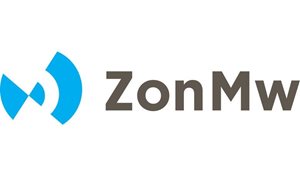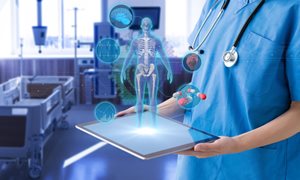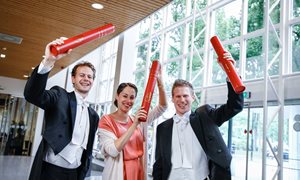13 February 2020
The winners come from all scientific disciplines. They are researching topics such as anatomical collections, the 'flow' of conversations, how computers can learn social aspects of language, the role of emotion in politics, and predicting droughts and floods.
One of the twelve award winners is Geert Litjens. He uses artificial intelligence to fundamentally change the research of tissues by pathologists. He develops smart computer algorithms that detect and interpret anomalies. His work is already quoted and imitated all over the world. Litjens' work can radically change an important part of the health care system.Nomination and award ceremony
Minister Van Engelshoven and President of the Academy Wim van Saarloos together with the winners of the KNAW Early Career Awards. Photo: Inge Hoogland
Nominations for the next round may be submitted from April 2020.

The winners come from all scientific disciplines. They are researching topics such as anatomical collections, the 'flow' of conversations, how computers can learn social aspects of language, the role of emotion in politics, and predicting droughts and floods.
One of the twelve award winners is Geert Litjens. He uses artificial intelligence to fundamentally change the research of tissues by pathologists. He develops smart computer algorithms that detect and interpret anomalies. His work is already quoted and imitated all over the world. Litjens' work can radically change an important part of the health care system.
Nomination and award ceremony
Minister Van Engelshoven and President of the Academy Wim van Saarloos together with the winners of the KNAW Early Career Awards. Photo: Inge HooglandNominations for the next round may be submitted from April 2020.
-
Want to know more about these subjects? Click on the buttons below for more news.
Related news items

Plugging the gap ZonMw/Health Holland grant
3 March 2020 RIMLS en RIHS researchers Willeke Daamen, Frank Vandenbussche, Joris van Drongelen, Toin van Kuppevelt and Janneke Grutters have been granted 1.3 million euro for the development and evaluation of a new technology to prevent premature rupture of fetal membranes (iPPROM). read more
Prostate cancer can now be diagnosed better using artificial intelligence
9 January 2020 RIHS researchers Wouter Bulten and Geert Litjens have developed a ‘deep learning’ system that is better than most pathologists at determining the aggressiveness of prostate cancer. The Artificial Intelligence system taught itself to identify prostate cancer based on data from over 1200 patients. read more
Awarded KWF grants for Radboudumc researchers
18 December 2019 KWF is investing 2.7 million euros in five different studies at Radboudumc. The awards are part of the new round of funding by DCS, in which over 34 million euros will be granted to Dutch cancer research. We congratulate our researchers with this funding and wish them success with their great work. read more
Jelle Barentsz's trilogy of educational papers in European Urology
12 December 2019 Recently, a trilogy of educational papers by our full professor Jelle Barentsz has been published in European Urology. The publications address what urologists need to know about prostate-MRI. read more
Awardees RIHS Junior Researcher round 2020
23 October 2019 Recently, RIHS held an internal call for Radboudumc junior researcher (PhD) positions. This year 6 positions have been awarded. read more
